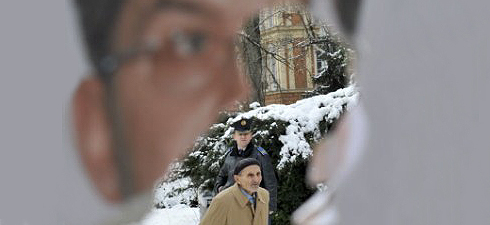The war between 1992 and 1995 killed more than 100,000 people and left Bosnia and Herzegovina physically and spiritually exhausted. The bloodletting came to an end in December 1995 with the signing of the Dayton Agreement, which set out the postwar organisation of the country and established international supervision over it. To support the peace process institutions were put in place under the Peace Implementation Council and the Office of the High Representative for Bosnia and Herzegovina.
The latter was invested with Tsar-like authority – and that’s no exaggeration. The OHR can repeal laws and impose new ones, and there is no appeal against his decisions. He can boot out elected politicians, dismiss judges or overrule their decisions. Yes, that’s how it is. Even today, sixteen years after the war. And the big question is: is this good or bad?
In June 2007 the successful Slovak diplomat Miroslav Lajčák took over the post of High Representative for Bosnia and Herzegovina. He was determined, he said, to force Bosnia's quarrelsome politicians to mend their ways and to move the country closer to the European Union. He intended to restore order, even if it meant fists banging on tables. "I simply won’t allow them not to come to agreements," he said.
Before Lajčák, the post in Sarajevo was held by the German Christian Schwarz-Schilling, who did next to nothing, not so much out of laziness as out of the conviction that foreign intervention in Bosnia could do more harm than good. In addition, the appointment was about to be terminated, and Schwarz-Schilling was meant to be the last of the High Representatives. But the situation failed to improve and Kosovo’s declaration of independence was clouding the air, threatening to destabilise the region. (That declaration came finally in February 2008). And so it was decided that the “High Representative" would stay on, and that Lajčák would assume the post.
A few things did fall into place. Lajčák, for example, induced the Bosnian parliament to vote through a police reform bill. He also succeeded in getting Bosnia to sign the EU Stabilisation and Association Agreement, which is the first step towards full membership. But there was no reform of the constitution, and that remains unchanged today. In March 2009 the Austrian diplomat Valentin Inzko took over from Lajčák, but so far he too has failed to budge the quarrelling politicians.
“The only one who could do something, I believe, would be Paddy Ashdown," says Tija Memiševičová, the thirty-five-year-old analyst who founded the European Research Centre in Sarajevo. The Briton Paddy Ashdown held the post of High Representative from 2002 to 2006.
"It's simple. Ashdown was a politician, not a diplomat. In addition, from a country that had long stopped caring what anyone from Germany, France or Brussels thought about this or that. I'm not saying it was always good, but he really used the powers that the position gave him. His successors, as diplomats, are still glancing back over their shoulders at Brussels and looking for consensus. And since there is no one single approach in Brussels, every step takes years to push through. And that,” she explains, “is why we’re still in trouble.”
Ashdown’s critics accuse him of having carried on like a king in Bosnia – they even nicknamed him ‘the king’. In the current situation, Tija feels that nothing much else would work. Her country, she’s convinced, has not got the strength to escape from its merry-go-round of strife. It needs someone from outside to come and bang his fist on the table.
Who would that be? The Americans, who played a key role in Bosnia in the postwar years? Hardly. For the U.S., Bosnia is no longer (and cannot be) a priority. They are taking the lead in the wars in Iraq and Afghanistan and would rather sort out their own serious economic troubles than a small Balkan country.
So, then, the European Union? Logically, yes. From Brussels comes the call: ‘We’re counting on you, Bosnia.’ And from Sarajevo comes the echo: ‘A future within Europe is our priority.’
Of course, it’s not that simple. There are problems on both sides, and bitterness too. Many in Bosnia feel that the EU has done nothing meaningful in their country and doesn’t want to either. They also worry that Russia, the traditional ally of the Serbs, is encroaching on the scene. Brussels argues in turn that Sarajevo cannot sit and wait for the EU to solve their problems: it blames Bosnian politicians for a lack of will to tackle reforms, to reconcile and to take practical steps.
Is there any solution? Yes, there is. Time is working in Bosnia’s favour. The proof is Serbia and even Croatia. Of course, they too still have problems, and nationalism has not vanished. But the Serbs have a president who has apologised for the Srebrenica genocide. The leader of Croatia is a calm, moderate president, a lawyer and composer, who openly admits that Croats committed war crimes too. And, importantly, most of these Croats respect him.
The war was madness, and the scars are slow to heal. But the situation isn’t hopeless.
Was this article useful? If so we are delighted!
It is freely available because we believe that the right to free and independent information is essential for democracy. But this right is not guaranteed forever, and independence comes at a cost. We need your support in order to continue publishing independent, multilingual news for all Europeans.
Discover our subscription offers and their exclusive benefits and become a member of our community now!












